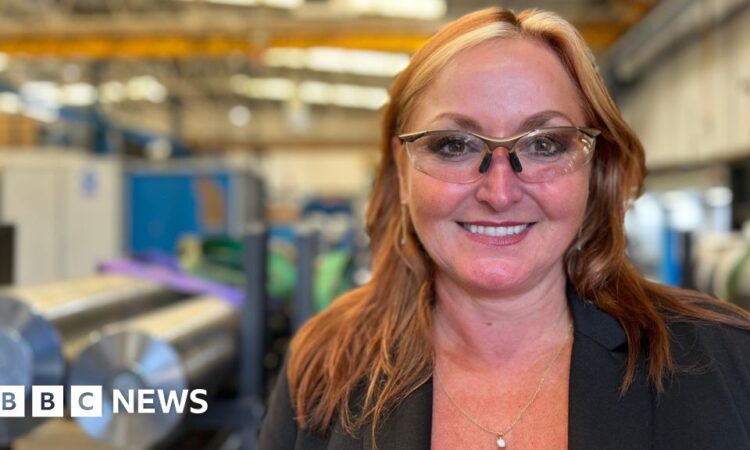
Image source, Charlotte Rose/BBC
- Author, Charlotte Rose
- Role, BBC News, Bedfordshire
The top priority of the new government must be to give “stability” to industry, manufacturing firms have said.
But its data showed the new constituency of Dunstable and Leighton Buzzard, in Bedfordshire, saw 35 firms fold since 2019.
During the election campaign, Labour said repeatedly it did not want to raise taxes or cut public services, but instead aimed to create wealth by growing the economy.
Image source, Charlotte Rose/BBC
Andrea Wilson is the director of Hone-All Precision Limited in Leighton Buzzard – a small and medium-sized enterprise (SME) that makes specialist tubes used in everything from the automotive and aerospace industries, to deep hole drilling and medical devices.
The firm has more than 4,000 customers, mainly in the UK.
Ms Wilson said her top ask from the new administration would be “an industrial strategy” to help government and industry work towards shared goals, and to stop the “short-termism and knee-jerk reactions” that had left the sector “in a mess”.
She would like to see a manufacturing champion, who would be someone who understood the industry and what it needed, and would then “go fight for it within government”.
Her second priority would be a rethink of vocational training and qualifications.
“We have a huge skills crisis – not just in engineering and manufacturing, but it is particularly acute in this industry. And we’ve been saying it for 25 years, but nothing has changed.”
She added a third demand, “stability”, which she said underpinned the first two.
“We don’t want the political upheaval that we’ve seen, the chopping and changing and flip-flopping.”
Ms Wilson said manufacturing could make a huge contribution to the regional and UK economy, but said: “We need to change perceptions about engineering.
“It isn’t dark and dirty, it’s not old technology,” she insisted, adding that all firms were working “to a high level of expertise and innovation”.
Image source, Charlotte Rose/BBC
A few miles away in Dunstable, Toby Garrett has a shiny new piece of equipment on his factory floor – a £1.5m plastic extrusion machine from Milan.
His firm, Twinplast, makes a type of corrugated plastic sheet that is lightweight but durable. It is mainly used in packaging and logistics but also in retail, construction, advertising and the pharmaceutical industry.
It aims to remove single-use cardboard from the supply chain, to replace it with a product that can be reused many times and then fully recycled at the end of its life.
Current Treasury rules allow firms to claim back 100% of the money spent on new machinery against their corporation tax, known as the “capital allowance”.
Mr Garrett said without it “we would never have been able to make that investment”.
For him, the best thing the new government could do to help would be to provide “a period of stability on things like corporation tax, business rates, energy prices and the investment regime”.
It was essential, he said, especially for SMEs, to be able to plan investments for the long term and help drive up productivity.
According to Make UK, manufacturing accounted for 10.9% of the economy in the East of England.
Within that, the largest sectors were food and drink (13.4%), followed by machinery and equipment (11.8%) and pharmaceuticals (10.8%).
While the two firms we spoke to mainly produced products for the UK, the biggest export market for firms in the East were the EU (54%), followed by North America (17%) and Asia and Oceana (15%).
In a Make UK survey of manufacturers in the East, the top three investments firms planned to make in the next 12 months were:
- Expansion of production capacity and increasing productivity
- Research and development
- Development and training of existing workforce
The survey suggested the firms saw their biggest opportunities in the next decade coming from sustainable and eco-friendly products, renewable energy technology, and AI and machine learning applications.






